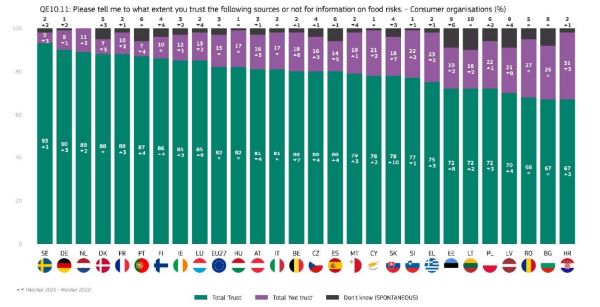 Eurobarometer 2025, Food Safety in the EU;
Eurobarometer 2025, Food Safety in the EU;
The latest Eurobarometer survey on food safety, released on Wednesday 29 October 2025, indicated that the majority of Luxembourg citizens care about the food they eat and trust the system that ensures its safety.
The survey, commissioned by the European Food Safety Authority (EFSA), revealed that nearly eight out of ten (85%) Luxembourg citizens believe that EU regulations help to ensure food safety, and more than three-quarters (82%) know that scientists are behind EU decisions in this field.
According to the 2025 Eurobarometer Survey on Food Safety in the European Union (EU), food safety ranks third among the factors influencing consumers’ purchasing decisions, following geographical origin and price.
Key findings of the 2025 Eurobarometer survey show that in Luxembourg, the origin of food is the most common factor affecting food-purchasing decisions (59%), followed by cost and food safety. The report highlights that more than seven out of ten respondents trust the EU as a source of information on food risks. Trust in national authorities and EU institutions has risen by 7% and 10% respectively since 2022.
Awareness of food safety in the EU is high and continues to rise. More than three-quarters of EU citizens know that scientists are behind food safety decisions, with 82% of respondents in Luxembourg acknowledging this. Nearly eight out of ten (85%) believe that EU regulations help to ensure food safety.
Nikolaus Kriz, Director-General of the EFSA, commented on these findings: “The latest Eurobarometer results are encouraging: more Europeans recognise and now trust the essential role of science in protecting the food we eat every day. But trust alone is not enough: citizens need clear and practical advice.”
According to Luxembourg’s Ministry of Agriculture, Food and Viticulture, an increasing number of Luxembourg citizens understand how EU food safety works.
Luxembourg’s Minister of Agriculture, Food and Viticulture, Martine Hansen, noted: “Significant progress has been made since the last Eurobarometer survey, particularly in Luxembourg, where many citizens feel better informed than in 2022. Established in 2022, the Luxembourg Veterinary and Food Administration (ALVA) pursues a holistic approach of integrated controls covering all links in the food chain. It is also committed to raising consumer awareness of the importance of food safety, so that every citizen feels safe and empowered to make the right nutritional choices here in Luxembourg.”
The ministry added that through the Safe2Eat information campaign, led by EFSA and EU countries, the organisation has spent the past five years transforming complex scientific data into practical guidance that helps Europeans to make safer and more informed food choices. The campaign continues to provide citizens with science-based advice to help them make informed choices and to strengthen public confidence in food safety.
Microplastics are the primary concern for 47% of Luxembourg citizens, followed by pesticide residues in food (40%) and additives in food and beverages (38%). Data indicates that microplastics are a growing concern across the EU, mentioned by one in three Europeans (33%), an increase of 4% since 2022.
According to regional differences, Eastern Europeans are more concerned about additives, Southern Europeans about pesticides and Nordic citizens about microplastics. Across the EU, concern about microplastics in food has risen to 33%, while awareness of additives and pesticide residues stands at 71% and 67% respectively. The overall trend shows growing public awareness of what their food contains.
EO








